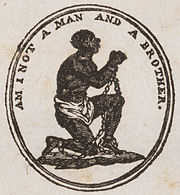Somerset v Stewart
| Somerset v Stewart | |
|---|---|
 |
|
| Court | King's Bench |
| Decided | 14 May 1772 |
| Citation(s) | (1772) 98 ER 499, (1772) 20 State Tr 1, (1772) Lofft 1 |
| Case opinions | |
| Lord Mansfield | |
| Keywords | |
| Slavery, abolition | |
Somerset v Stewart (1772) 98 ER 499 (aka Somersett's case, or in State Trials v.XX Sommersett v Steuart) is a famous judgment of the English Court of King's Bench in 1772, which held that chattel slavery was unsupported by the common law in England and Wales, although the position elsewhere in the British Empire was left ambiguous. Lord Mansfield decided that:
The state of slavery is of such a nature that it is incapable of being introduced on any reasons, moral or political, but only by positive law [statute], which preserves its force long after the reasons, occasions, and time itself from whence it was created, is erased from memory. It is so odious, that nothing can be suffered to support it, but positive law. Whatever inconveniences, therefore, may follow from the decision, I cannot say this case is allowed or approved by the law of England; and therefore the black must be discharged.
Slavery had never been authorised by statute in England and Wales, and Lord Mansfield's decision found it also unsupported in common law. Lord Mansfield narrowly limited his judgment to the issue of whether a person, regardless of being a slave, could be removed from England against his will, and said he could not. Even this reading meant that certain property rights in chattel slaves were unsupported by common law. It is one of the most significant milestones in the abolitionist campaign.
Some historians believe the case contributed to increasing colonial support for separatism in the Thirteen Colonies of British North America, by parties on both sides of the slavery question who wanted to establish independent government and law. The southern colonies wanted to protect slavery and expanded its territory dramatically in the decades after independence was won.
...
Wikipedia
